- Criteria for evaluating SEO companies, including track record, transparency, technical competence, and alignment with business goals
- Key SEO services small businesses should expect: keyword strategy, on-page optimization, technical fixes, local SEO, link building, and analytics
- Pricing expectations and selection process, including realistic budgets, vetting steps, red flags, and aligning SEO strategy with commercial objectives
As someone who has worked with small businesses, startups, and agencies for over a decade, I know how overwhelming it can be to navigate the world of SEO vendors. You’re told SEO is essential, but how do you actually choose the right SEO company that can move the needle? This guide answers that question exhaustively. I’ve structured it to give you a clear understanding of what SEO companies actually do, how they work with small businesses, what you’ll pay, and how to avoid hiring the wrong people.
This isn’t SEO 101 fluff. I’m writing this for business owners, marketing leads, and decision-makers who need to make a smart, informed investment in SEO and want results, not just deliverables.
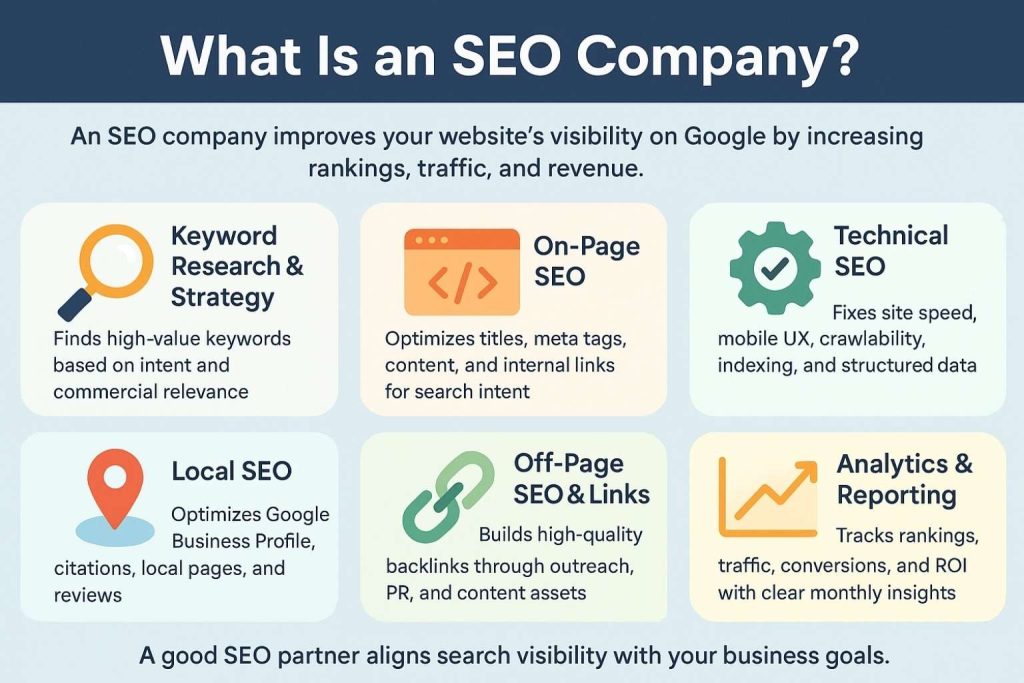
What Is an SEO Company?
An SEO company is an external team that helps improve your website’s visibility in search engines like Google. Their primary goal is to increase your organic (unpaid) traffic by improving your search engine rankings. If done correctly, SEO drives qualified traffic that turns into leads, sales, and long-term revenue.
Some SEO companies are full-service digital marketing firms with SEO departments. Others are SEO-only specialists. Either way, they typically have expertise across the core SEO disciplines: keyword strategy, content optimization, technical fixes, link building, and analytics. They may also support related services like Google Ads, web design, or conversion optimization, but their main focus is to improve your site’s visibility on search engines for the keywords that matter most to your business.
Whether you’re a local service provider, an e-commerce brand, or a B2B SaaS company, a good SEO partner will align their work with your commercial goals.
Typical Services SEO Companies Offer
Let’s break down the primary SEO services you should expect from a reputable agency. Not every firm offers everything; some specialize in one or two areas, but a well-rounded provider should deliver most or all of the following.
Keyword Research and Strategy
This is foundational. SEO starts with understanding how your audience searches. A competent agency will conduct thorough keyword research using tools like Ahrefs, Semrush, or proprietary data. They’ll identify short-tail, mid-tail, and long-tail queries that your target customers use throughout the funnel.
More importantly, they’ll prioritize keywords based not just on volume, but on intent, competitiveness, and business value. Then they’ll map keywords to your existing pages and develop a content strategy to fill gaps.
Bad SEO companies slap keywords onto random pages. Good ones build keyword-driven architecture that matches user behavior and supports your commercial goals.
On-Page SEO
Once you have a keyword strategy, on-page SEO is where implementation begins. This includes optimizing:
- Page titles and meta descriptions
- Heading structures (H1s, H2s, etc.)
- Internal linking
- Image alt text and file structure
- Keyword placement and density
- Content length, depth, and quality
A good SEO company doesn’t just sprinkle keywords. They assess whether each page deserves to rank for its target terms. If the content is thin, outdated, or misaligned with search intent, they’ll rewrite or replace it.
Technical SEO
Search engines are picky. If your site has crawl errors, broken links, slow load times, or bad mobile UX, you won’t rank, no matter how good your content is.
Technical SEO includes:
- Site speed optimization
- Mobile responsiveness and Core Web Vitals
- Crawlability and indexation control
- Structured data/schema implementation
- Internal linking health
- HTTPS security
- XML sitemap and robots.txt validation
Great agencies run site audits with tools like Screaming Frog, Sitebulb, or Google Search Console, then fix issues systematically. You’d be surprised how many ranking issues stem from a misconfigured website, not a lack of content.
Local SEO
If you’re a small business serving a specific region or city, local SEO is critical. Ranking in the local map pack (Google Maps 3-pack) brings foot traffic, phone calls, and high-intent customers.
Local SEO work includes:
- Optimizing your Google Business Profile (formerly Google My Business)
- Building local citations (consistent NAP across directories)
- Generating and responding to reviews
- Creating localized landing pages
- Using location-based keywords on the site
Any SEO company offering local optimization should have a proven track record of ranking small businesses in map packs and local organic results. Ask to see examples.
Off-Page SEO and Link Building
Links are still one of Google’s most powerful ranking signals. Quality backlinks from relevant, authoritative websites tell Google your site is worth showing.
Effective link building isn’t spammy. It’s built around earning placements that naturally fit within the surrounding content environment, not forcing links into irrelevant pages. It involves:
- Guest posting on relevant blogs
- Digital PR (earning coverage or quotes)
- Linkable asset creation (infographics, research, tools)
- Manual outreach to webmasters and journalists
- Resource page and unlinked brand mention tactics
A red flag: Any agency promising “500 links per month.” Focus on link quality, not volume. A few well-placed backlinks can outperform hundreds of garbage links.
Analytics and Reporting
Good SEO isn’t guesswork. Your agency should track and report on:
- Keyword rankings
- Organic traffic
- Click-through rates
- Bounce rate and dwell time
- Conversion rate (form fills, phone calls, sales)
- ROI over time
You should get monthly reports with plain-English commentary, not just automated screenshots. A great agency will also meet with you regularly to discuss progress, challenges, and strategic pivots.
How SEO Companies Work with Small Businesses
SEO for small businesses isn’t just scaled-down enterprise SEO. The process must match your business size, resources, and goals. Here’s what you can expect when you partner with a good SEO agency.
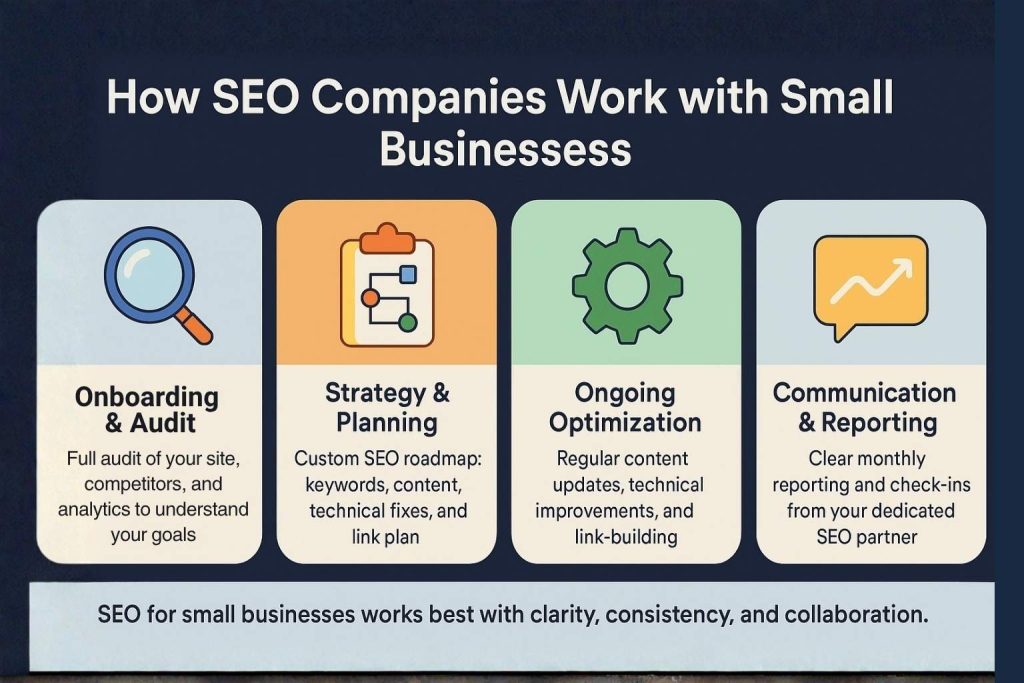
Initial Onboarding and Site Audit
Every partnership should begin with a discovery process. This includes:
- Business and goals intake: Understanding your products, services, target audience, and KPIs.
- Website audit: Evaluating technical SEO health, content quality, backlink profile, and keyword rankings.
- Competitive analysis: Identifying who ranks above you and why.
- Analytics review: Ensuring Google Analytics, Search Console, and tracking pixels are correctly configured.
A proper audit is not optional. It informs the entire SEO roadmap. If an agency skips this step or rushes into implementation, that’s a problem.
Strategy Development and Planning
After the audit, your agency should create a custom strategy document. It should include:
- Keyword targeting and page mapping
- Content priorities (what to update, delete, create)
- Technical fixes and platform constraints
- Link-building approach
- Local SEO tasks (if applicable)
- Timeline and success metrics
This is the blueprint. It shows you what to expect and when, so you’re not blindly paying for “SEO work” with no visibility into the plan.
Contract Terms and Duration
Most SEO companies work on a monthly retainer model, often with a 6- to 12-month minimum contract. That’s not because they’re trying to trap you; SEO simply takes time. If a company claims they can deliver real organic growth in one month, they’re not being honest.
That said, the best agencies structure their contracts to be performance-transparent. If they’re producing results, you’ll want to keep working with them anyway.
Ongoing Optimization and Collaboration
Once the campaign is live, your SEO partner should be:
- Publishing or optimizing content regularly
- Executing technical updates as needed
- Monitoring traffic, rankings, and site performance
- Building links or running PR outreach
- Testing and adapting strategy based on what’s working
This is where you see whether an agency is strategic or just task-driven, which is easier to recognize when you understand how responsibilities are typically divided within a well-functioning SEO team. Do they spot opportunities? Do they communicate proactively? Are they pushing you forward or waiting for you to follow up?
Communication and Reporting
Expect monthly reporting, ideally a combination of visual dashboards and written insights. You should also have a dedicated point of contact who meets with you on a monthly (or biweekly) basis to explain progress, discuss challenges, and align on priorities.
SEO is complex. Your agency’s job is to make it understandable and actionable. If they speak in jargon or avoid your questions, that’s a trust issue.
SEO Pricing Models and What You Can Expect to Pay
Pricing is one of the most confusing aspects of hiring an SEO company. Here’s a breakdown of the most common pricing structures and what you can expect in the U.S. market.
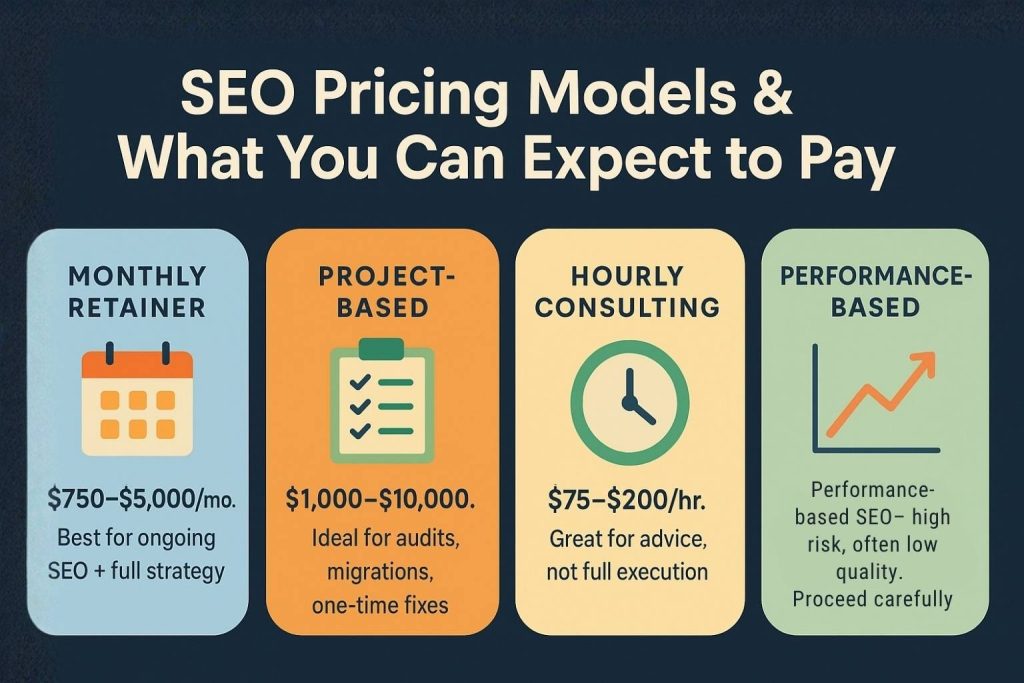
Monthly Retainer
The most common model, especially for ongoing campaigns.
- Typical range: $750 to $5,000+ per month
- Lower-cost agencies may offer basic local SEO or light content updates
- Mid-range providers ($1,500–$3,000/month) offer comprehensive strategies, content, link building, and reporting
- High-end firms ($4,000+/month) deliver enterprise-level services, aggressive growth strategies, and broader digital marketing integration
Pros:
- Predictable billing
- Strategic continuity
- Regular reporting and collaboration
Cons:
- Risk of paying for mediocre execution unless you vet carefully
Project-Based Pricing
Used for defined deliverables like:
- Full-site SEO audits
- Keyword research documents
- Website migrations
- Technical SEO cleanup
Typical range: $1,000 to $10,000, depending on scope
Pros:
- Good for businesses that want to test the waters
- Defined start and end points
Cons:
- No long-term accountability
- Doesn’t drive compounding gains like continuous SEO does
Hourly Consulting
Ideal for ad hoc help or strategy review.
- Typical rate: $75 to $200 per hour
- Some solo consultants and boutique experts offer this for high-level advice or training
Pros:
- Flexible
- No long-term contract
Cons:
- Doesn’t scale well for implementation
- You still need in-house or external execution
Performance-Based SEO
This model ties payment to results, such as rankings or leads. Sounds great, right? It rarely is.
Cons:
- Results can be gamed
- Incentivizes spammy or black-hat tactics
- May not align with long-term brand health
If someone offers this model, read the fine print. You’ll often find vague guarantees and manipulative pricing mechanics.
How to Choose the Right SEO Company
I’ve seen too many small businesses get burned by shady SEO providers who promise the world, deliver fluff, and leave them worse off than before. The problem isn’t just bad actors. It’s also that most people don’t know what to look for or what questions to ask before signing a contract.
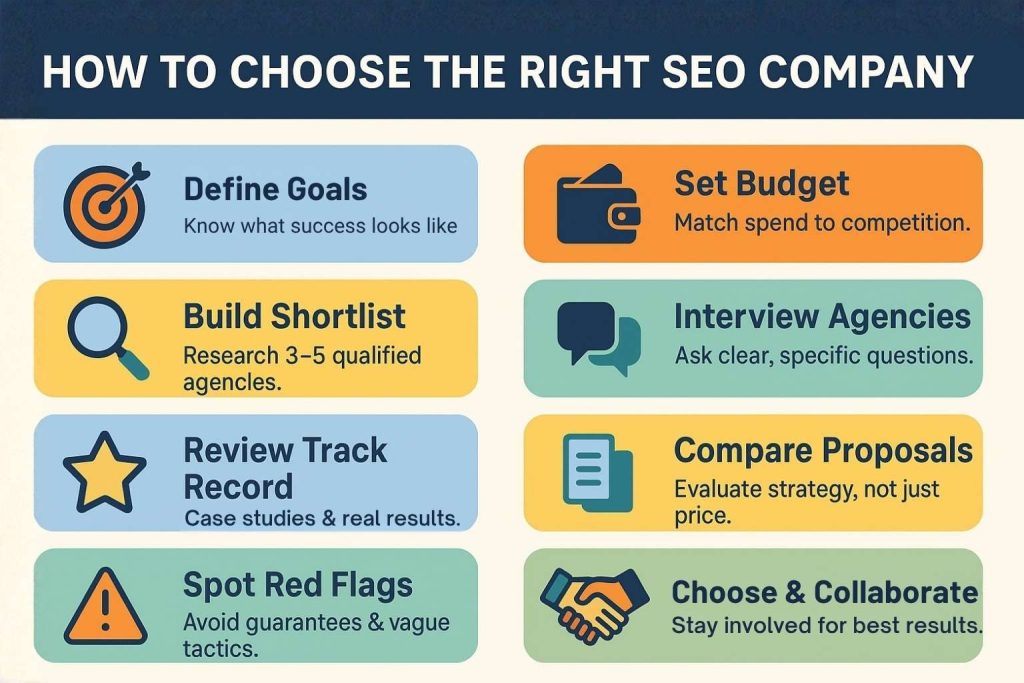
Here’s the process I recommend when selecting an SEO partner. It’s detailed, yes, but that’s the level of due diligence your business deserves.
Step 1: Define Your SEO Goals
Start with clarity. What does success look like for you?
- Do you want to rank locally and drive phone calls or foot traffic?
- Do you need more inbound leads through forms or calls?
- Are you trying to grow e-commerce sales?
- Do you need a technical SEO partner to stabilize your site?
Define your business objectives and translate them into measurable SEO outcomes. Without this, every agency pitch will sound good, and you’ll end up choosing based on charisma or price instead of fit.
Step 2: Set a Realistic Budget
You don’t need to spend $10,000/month to get results. But if you have less than $500/month to invest, you’re probably not ready to hire a professional SEO firm.
Think of SEO like investing in infrastructure: it pays off over time, but only if the foundation is strong. Depending on your needs and competition level, expect to spend:
- $750–$1,500/month for basic local SEO or early-stage content campaigns
- $1,500–$3,000/month for more competitive markets or broader strategies
- $3,000+/month for aggressive growth, e-commerce, or multi-location campaigns
If your budget is limited, focus on a specialist who can do one thing well (e.g., content or local SEO), not a generalist promising everything.
Step 3: Research and Build a Shortlist
Use a mix of:
- Referrals from trusted peers
- Google searches for “SEO company + [your city or industry]”
- Review sites like Clutch, G2, or UpCity
- Checking the SEO agency’s own rankings and content (if they can’t rank themselves, that’s a red flag)
Create a shortlist of 3 to 5 candidates that specialize in your business type, industry, or goals.
Step 4: Evaluate Their Track Record
Ask to see:
- Case studies with measurable results (before/after traffic, rankings, conversions)
- Client references or testimonials, not just logos
- Industries served do they understand your market?
- Sample reports or deliverables, get a feel for how they communicate
You’re looking for evidence that they’ve helped businesses like yours grow through SEO, not vague anecdotes or inflated promises.
Step 5: Interview the Agency
You’re not buying a product. You’re hiring a team. Meet them.
Ask direct, specific questions:
- Who will be managing our account? Will I have a dedicated strategist?
- How do you measure SEO success? What KPIs do you track?
- What’s your approach to link building? Do you use outreach, PR, content, or directories?
- Do you handle content in-house or outsource it?
- How do you stay updated with algorithm changes?
- Can you explain a campaign where rankings dropped and how you responded?
Their answers will tell you everything about their philosophy, transparency, and expertise.
Step 6: Watch for Red Flags
Some agencies look polished on the surface but fall apart when you dig deeper. These warning signs should give you pause:
- Guaranteed #1 rankings- No one can guarantee this. Period.
- No transparency around tactics- If they’re vague, they’re hiding something.
- Black-hat link building or PBN use- These tactics might work short-term, but invite penalties long-term.
- Outsourcing everything to low-cost freelancers- You’re paying for quality. Know who’s doing the work.
- Boilerplate audits or strategies- If their pitch feels generic, their work probably will be too.
- No clear deliverables or timelines- Ambiguity around work scope means a lack of accountability.
Step 7: Compare Proposals Thoughtfully
At this point, you should have 2 or 3 proposals in hand. Don’t just compare pricing, compare:
- The depth of their strategy
- The experience of their team
- The clarity of deliverables
- How aligned they are with your goals
- How well they explain risks, trade-offs, and timeframes
Choosing an SEO company is a strategic partnership, and that decision becomes easier when your marketing efforts already have strong strategic oversight that guides long-term direction. Go with the firm that shows the most understanding, not the one that says yes to everything.
Step 8: Make a Decision, Then Stay Involved
Once you’ve chosen, sign a clear contract that includes:
- Scope of work
- KPIs
- Timelines
- Communication cadence
- Exit clauses
Then stay engaged. Review reports. Ask questions. Share updates about your business. The best SEO campaigns happen when client and agency collaborate, not when the business “sets it and forgets it.”
Aligning SEO Strategy with Business Goals
Every SEO strategy must begin and evolve with the business’s actual goals. One of the clearest signs of alignment is when search efforts fit naturally within a broader content approach designed to support those goals. Without this alignment, you end up ranking for vanity keywords that don’t drive results. I’ve seen too many agencies generate traffic that doesn’t convert because the strategy was misaligned from the start.
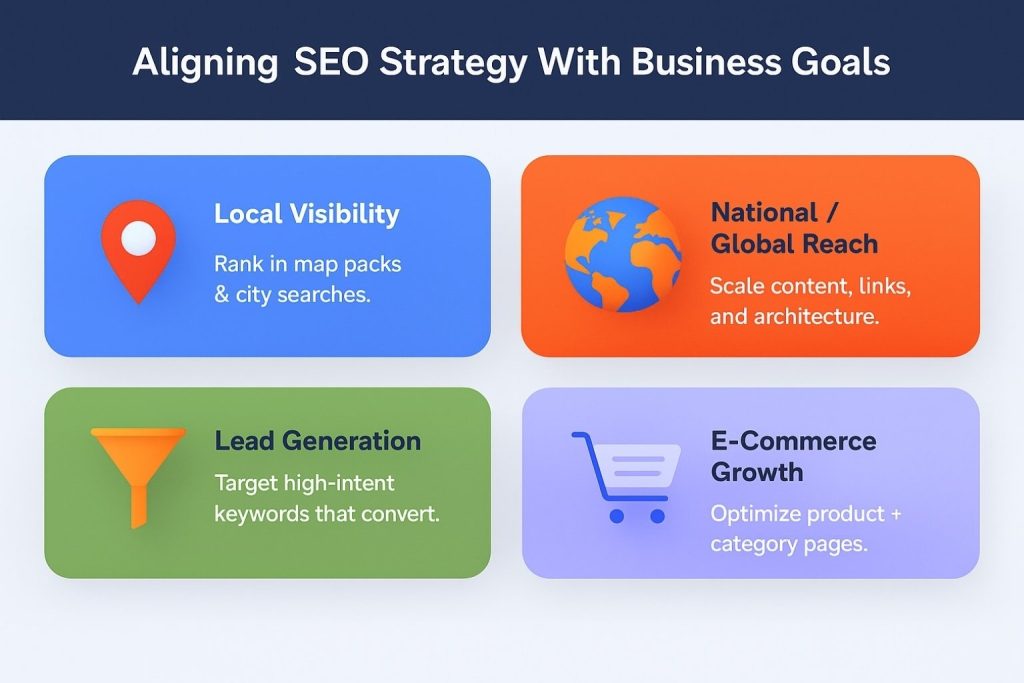
Let’s walk through how to pair specific business objectives with SEO approaches that actually support them.
Local Visibility
If you’re a service-area business, HVAC, plumbing, real estate, legal, healthcare, etc., success often depends on having structured guidance that strengthens your local presence across channels, not just your search listings. your main concern is showing up when someone searches “[service] near me” or “[city] [service]”.
SEO focus areas:
- Google Business Profile optimization
- Local citations with consistent NAP (Name, Address, Phone)
- City- or neighborhood-specific landing pages
- Review generation and management
- Local schema markup
- Earning backlinks from local news, blogs, and directories
Local SEO is less about national traffic and more about dominating your service area. It’s high-intent, and it converts fast if done right.
National or International Reach
For e-commerce brands, SaaS companies, publishers, or multi-location chains, local rankings alone won’t cut it. You need broad keyword visibility across the country (or globe).
SEO focus areas:
- Scalable keyword research tied to buyer journey stages
- Product or service page optimization at scale
- Authoritative link acquisition and PR outreach
- Technical SEO to support a growing architecture (especially if you’re on Shopify, WordPress, Magento, etc.)
- Strong site taxonomy and internal linking
In this case, content and backlinks are your primary growth levers, not local map packs.
Lead Generation
If your business relies on quote requests, demo sign-ups, or phone inquiries, SEO should work in tandem with your conversion strategy.
SEO focus areas:
- Targeting middle- and bottom-funnel keywords with transactional intent
- Creating landing pages designed to convert
- Optimizing CTAs, forms, and funnel logic
- Using schema for services, FAQs, and reviews
- Building topical authority in your niche
Lead generation SEO isn’t just about traffic. It’s about traffic that becomes a pipeline. Always connect SEO performance to qualified leads, not just pageviews.
E-Commerce Sales
Online stores thrive or fail based on product visibility. SEO should drive people to product and category pages that convert into checkouts.
SEO focus areas:
- Optimizing product titles, descriptions, and metadata
- Category page hierarchy and filters
- Schema markup for product details, reviews, and availability
- Addressing duplicate content and crawl issues at scale
- Building internal links between categories, collections, and editorial content
- Generating links via affiliate relationships, PR, or influencers
E-commerce SEO is a technical and competitive field, and many brands achieve stronger outcomes when supported by strategic marketing leadership tailored to digital commerce environments. You need both clean architecture and aggressive off-page efforts to gain traction.
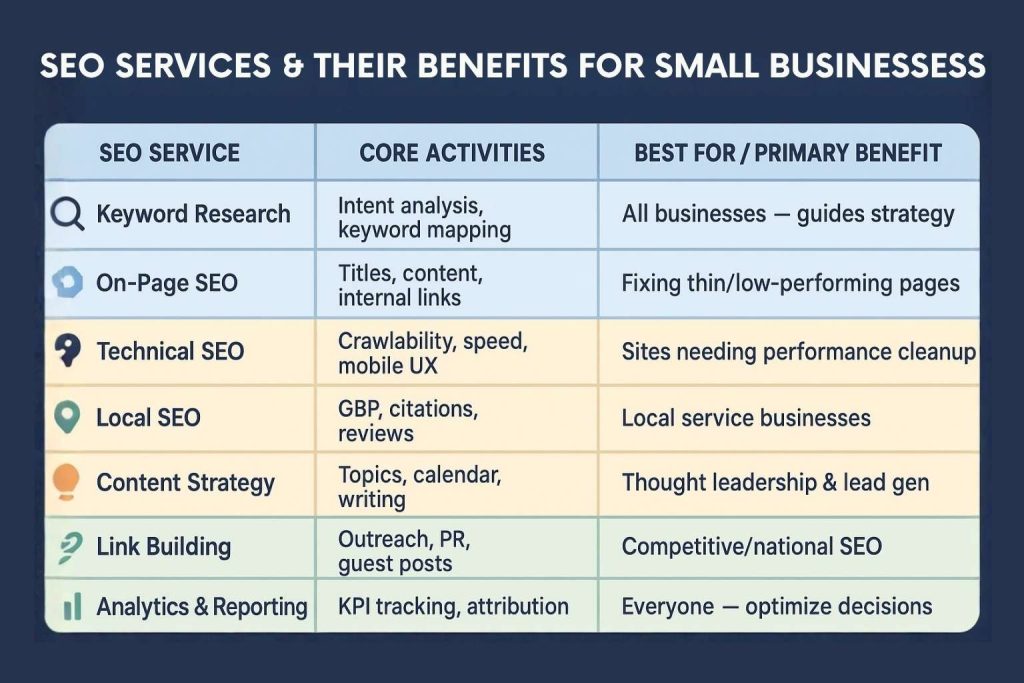
Comparison Table: SEO Services and Their Benefits for Small Businesses
| SEO Service Type | Core Activities | Best For | Primary Benefits |
| Keyword Research | Audience intent analysis, keyword mapping, opportunity prioritization | All businesses | Guides strategy, avoids wasted content |
| On-Page SEO | Title/meta tags, content optimization, internal linking | Sites with thin or underperforming pages | Boosts rankings and user engagement |
| Technical SEO | Crawlability, mobile UX, site speed, structured data | Mid-sized to large sites, or underperforming websites | Enhances performance, removes ranking blockers |
| Local SEO | Google Business Profile, reviews, local citations, geo pages | Local service businesses | Increases visibility in local searches |
| Content Strategy | Topic ideation, blog/content calendar, conversion-driven writing | Thought leadership, lead gen, and authority building | Drives organic traffic and brand awareness |
| Link Building | Outreach, PR, guest posts, brand mentions | Competitive niches, national SEO | Builds authority, improves domain ranking strength |
| Analytics & Reporting | KPI tracking, conversion analysis, and ROI attribution | All businesses | Shows what’s working and where to optimize further |
Final Thoughts and Recommendations
Hiring the right SEO company is one of the highest-leverage decisions you can make as a small business. But it’s also one of the easiest to get wrong if you don’t approach it with the same rigor you’d apply to hiring a key employee.
Here’s what I want you to take away from this guide:
- Don’t outsource SEO blindly. Get clear on your goals, your budget, and your expectations.
- Treat SEO like a growth channel, not a checkbox on a marketing to-do list.
- Choose an agency based on strategic alignment, not promises.
- Demand transparency. A good agency wants you informed, not dependent.
- Stay involved. Even the best SEO campaign needs client input, feedback, and context to succeed.
You don’t need to be an SEO expert. But you do need to hire one you trust and then hold them accountable to outcomes, not activity.
If you do that, SEO can become a compounding advantage that delivers long-term returns far exceeding those of paid advertising or short-term growth hacks. And that’s how small businesses win.
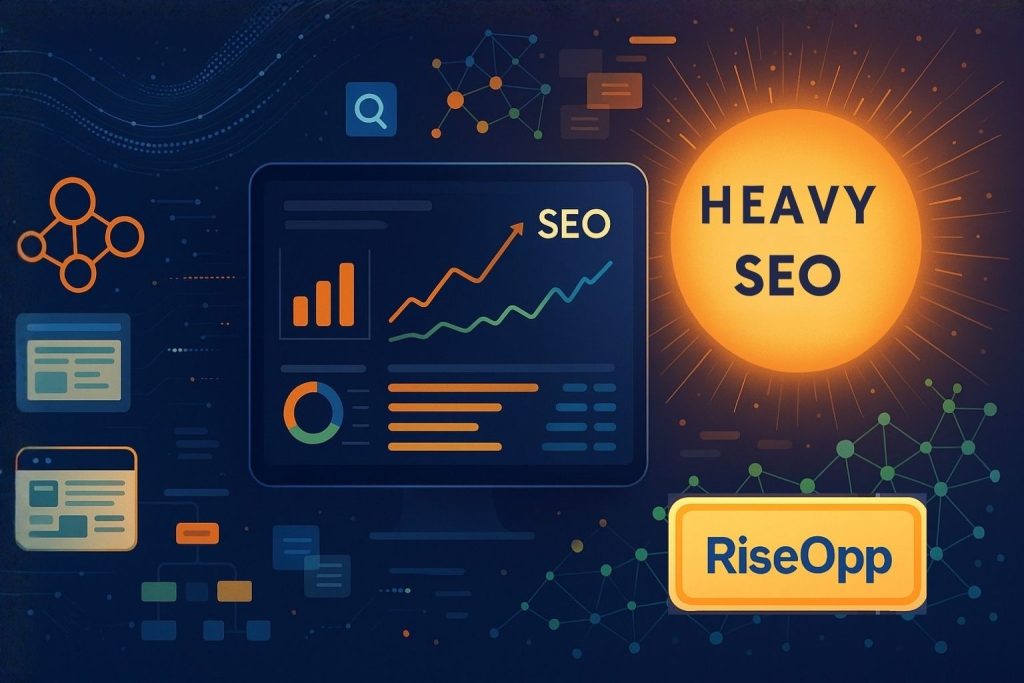
How We Approach SEO at RiseOpp
At RiseOpp, we’ve helped companies across industries build search visibility that compounds over time, not just quick wins that disappear with the next algorithm update. If you’ve made it this far, you already understand how nuanced and strategic SEO needs to be. That’s exactly why we built our proprietary Heavy SEO methodology.
Unlike traditional SEO approaches that target a narrow set of high-volume keywords, our Heavy SEO strategy is designed to rank your site for tens of thousands of keywords simultaneously. It’s a scalable, content-rich system that we’ve developed and refined through deep technical experience and pattern recognition across a broad portfolio of client campaigns. And it works.
As part of our broader Fractional CMO services, we often guide clients not only through SEO execution but also through high-level marketing leadership and strategy. This includes brand positioning, building in-house teams, and orchestrating multi-channel campaigns across SEO, paid media, PR, and other channels. Whether you’re a fast-scaling B2C brand or a complex B2B organization, we can help you turn SEO into a durable growth engine.
If you’re serious about building long-term search authority and want a partner who can lead from both a strategic and executional level, we should talk.
Comments are closed